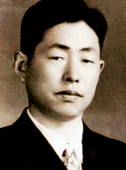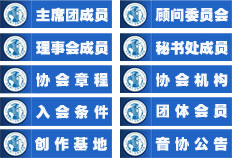
郑律成(1914—1976),原名郑富恩,出生于韩国全罗南道光州。后加入中国国籍。先后在北京人民艺术剧院、中央歌舞团、中央乐团从事音乐创作,其作品耳熟能详,被广为传颂。主要作品:歌曲《延安颂》、《延水谣》、《八路军军歌》、《八路军进行曲》(后改名为《中国人民解放军进行曲》被定为中国人民解放军军歌)、《兴安岭组歌》、《朝鲜人民军进行曲》、《中国人民志愿军进行曲》,少儿歌曲《我们多幸福》、《星星歌》,为毛泽东诗词谱曲合唱《十六字令三首》、《娄山关》,歌剧《望夫云》等。中国原国家副主席王震在《作曲家郑律成》序言中写道:"他是当代继聂耳、冼星海之后,又一位杰出的优秀的作曲家,是中国无产阶级革命音乐事业的开拓者之一。"
Zheng Lvcheng (1914 - 1976), formerly known as Zheng Fuen, was born in South Korea South Jeolla province of Kwangju. After adding China nationality. In the music creation in the Beijing people's Art Theatre, the central song and dance ensemble, the Central Philharmonic Orchestra successively, whose work was praised for having heard it many times. The main works: the song "Ode to Yanan", "Yin", "water is the Eight Route Army", "song of the Eight Route Army march" (later renamed "China people's Liberation Army march" was designated as the China people's Liberation Army), "Xingan Ling suite", "the Korean people's Army march", "China people's march of the volunteers", children's song "how happy we", "star song", Mao Zedong's poems to music for chorus "sixteen words to three first", "pass", the opera "Wang Yun Fu" etc.. Chinese former vice president Wang Zhen wrote in "composer Zheng Lvcheng" in the preface: "he is a contemporary after Nie Er, Xian Xinghai, and an outstanding outstanding composer, is one of the proletarian revolution career China pioneer."


